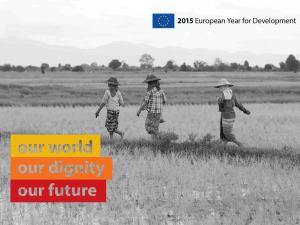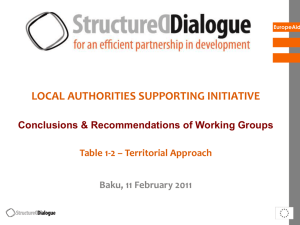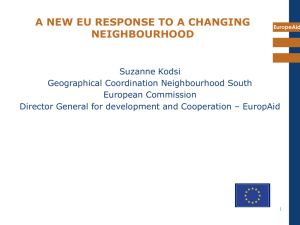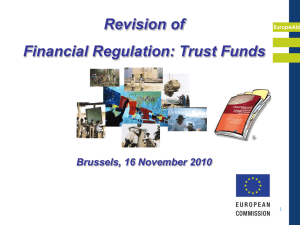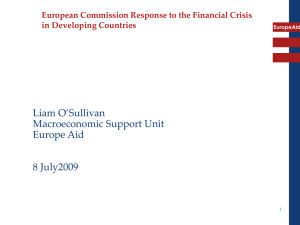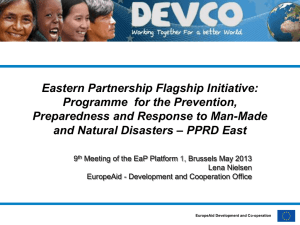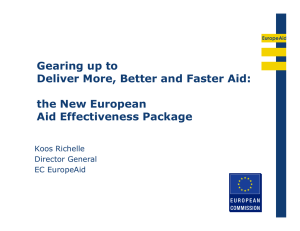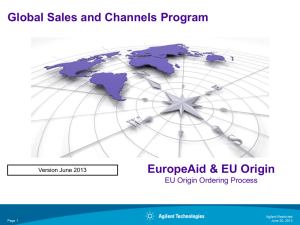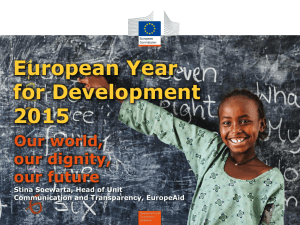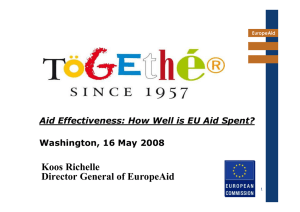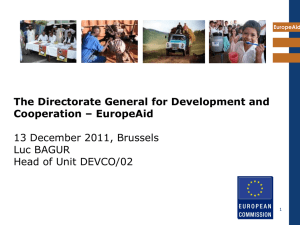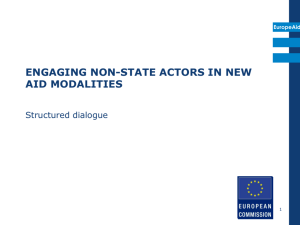The private sector as
advertisement
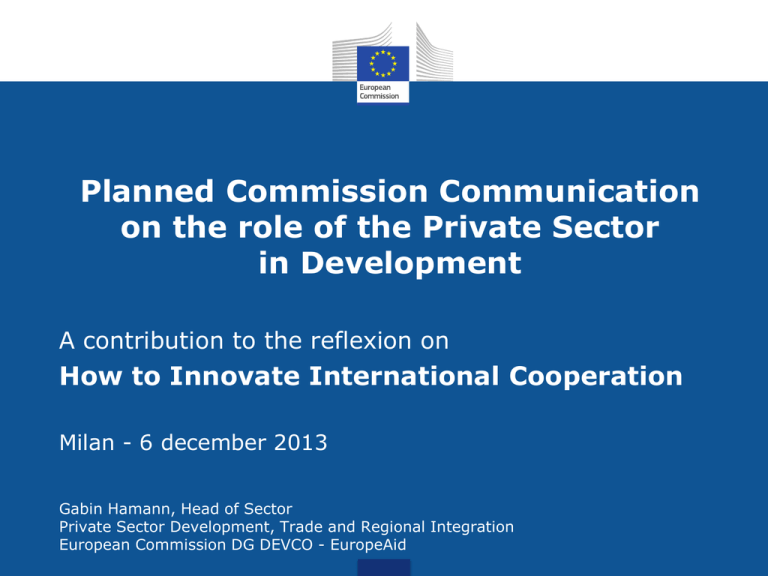
Planned Commission Communication on the role of the Private Sector in Development A contribution to the reflexion on How to Innovate International Cooperation Milan - 6 december 2013 Gabin Hamann, Head of Sector Private Sector Development, Trade and Regional Integration European Commission DG DEVCO - EuropeAid EuropeAid AGENDA Finding a common language: Terms and definitions in EU support to private sector development and engagement Global policy context of the proposed Communication Objectives of the Communication Timeline and next steps Issues and questions for consultation 2 EuropeAid Finding a common language… Private sector engagement for development Multistakeholder alliances Private sector development support Development Partnerships / challenge funds Private-Public Dialogue Blending Private sector trade and investment PPPs Donors, Public Sector Companies Private-Public Collaboration 3 EuropeAid Finding a common language… Civil Society Organisations Watchdog of industry Implementation partner Multistakeholder alliances Donors, Public Sector Providing expertise on local situation Companies 4 EuropeAid Global policy context of the proposed Communication Agenda for Change: Calls for making the private sector a main partner in development Aims for greater use of blending to mobilise private capital Strengthening private-public collaboration in other sectors (e.g. energy, agriculture, infrastructure) Busan HLF on Aid Effectiveness: Recognizes central role of the private sector in development and encourages closer private-public engagement for development. Post-2015 global agenda and Rio+20 (SDGs): Private sector as main partner in developing and implementing post-2015 agenda. Role of private sector in transition to a green economy. 5 EuropeAid Objectives of the communication Update the EU Private Sector Development support strategy ; Explore ways to enhance the effectiveness of EU PSD support though closer engagement with the private sector and based on recommendations from EU PSD evaluation; Explore the value-added of a framework for structured dialogue and coordinated EU action with private sector on development issues (e.g. European platform for PS engagement); Identify opportunities and approaches for private-public collaboration in sectors such as energy, infrastructure and agriculture; Identify ways to use EU blending mechanisms to support local private sector development and mobilize private sector funding for development; Elaborate on role of the private sector in a post-2015 framework. 6 EuropeAid Timeline Oct.2013: Approval from Secretary General and inclusion of roadmap in 2014 agenda planning of Commission Nov. 2013: First stakeholder consultations with • Member States and non-EU donors • Private Sector (BDI, informal dialogue with business); • EDD (brainstorming session on Communication) • CSOs (Policy Forum on Development) • DEVCO internal and Inter-Service Consultation groups Dec. 2013 - March 2014: Consultations in EU and partner countries March 2014: Submission of final draft to Inter-Service Consultation April2014: Adoption by College 7 EuropeAid Issues for consultation - Policy forum, Brux 28/11 Issue 1: EU support to local private sector development What should be future priorities of EU PSD support? How to support micro-enterprises and workers in the informal sector? Issue 2: The role of the European private sector in development What can the European private sector do to contribute to inclusive and sustainable growth in developing countries? Should the EU engage with the European private sector to increase its impact on development? If so, in what form? What are the risks of engaging with the private sector, and what principles have to applied to manage these risks? 8 EuropeAid Issues for consultation (continued) Issue 3: Introducing a people-centered and rights-based approach What instruments exist and should be promoted to implement such an approach? Should companies be part of the post-2015 framework, and what should be their role and responsibility? Issue 4: Enhancing dialogue with the private sector Should more private sector actors be represented in the EU's structured dialogue with CSOs? (EU and partner countries)? Should the EU establish separate mechanisms for dialogue with the private sector? Should NGOs be included? For what purpose? Do you have good or bad examples of country-level private public or multi-stakeholder (policy) dialogue? 9 EuropeAid Issues for consultation (continued) Issue 5: The private sector as “delivery channel” for development What risks and opportunities do you see in the private provision of public goods and services (like energy, transport, health)? How and when can multi-stakeholder alliances be an effective model for the private provision of goods and services to the poor? Do you see risks in creating, wherever possible, opportunities for local private sector in EU sectoral programmes (e.g. agriculture, health, environment, employment)? 10 EuropeAid Short feed back from the discussion • . Business enabling improvement is key • . Support Public-private dialogue, inclusive, include social partners including at country level is key • . High expectation in relation to a right based approach in relation to business and PSD, • . PS has to stick to aid effectiveness principles (ownership, transparency, accountability …) • . Impact assessment is important: have to know what works and not • . Blending and ppp balance positive and negative aspect • . Go further than minimal international standards • . Support decent employment • . Potential of cooperatives and social enterprises • . Potential of value chains and (fair) trade 11 • . Concentrate on high impact (in terms of job) sectors EuropeAid EDD 26/27 - Multistakeholder partnerships: CSOs & Private Sector, joint agents for change? • Cross-sector collaboration for development cooperation is rapidly increasing • Inclusive growth, economic as well social, starts with a bottom up approach Recommendations for successful partnerships: • Openness and trust are key for success- motives should be well identified before starting any interaction • Based on their motives and on their skills, the actors of a partnership can adopt different roles, which should also be well identified to avoid a blurring of identities. • Keeping the various roles distinct would be a way to overcome the risk of drifting towards practices that would not comply with the original mindset. 12 EuropeAid Conclusions of the round table discussions • Key factor : trust building • Money channelled through private sector to be additional • CSOs natural interlocutors/intermediaries for private sector. Area of cooperation, rather than competition. 13 Thank you! Would you like to further contribute in writing? Please send submissions to EUROPEAID-C4@ec.europa.eu. Unit C4 - Private Sector Development, Trade, Regional Integration European Commission, DG DEVCO – EuropeAid 14
